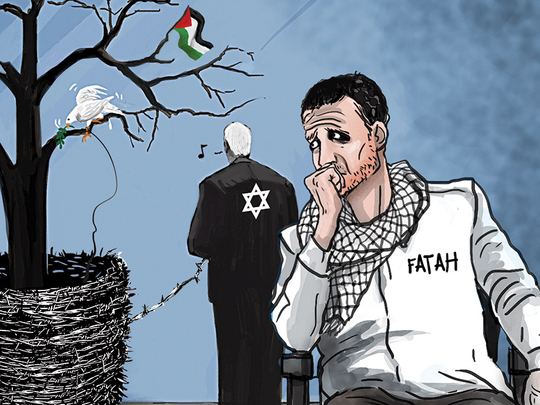
It is hoped and expected that the Fatah movement’s priority will be to embark immediately on implementing its seventh Congress resolutions and recommendations (approved in its meeting in Ramallah on December 4, 2016) and which it has considered as a plan of action and a roadmap for the upcoming period.
A number of writers and researchers who are not necessarily opposed to the movement wished to see it undertake constructive self-criticism, assessment and revision of past experiences in its history, while developing a plan with steps for confronting the Israeli occupation with a focus on the much-needed Palestinian popular resistance.
Regardless of the many views and attitudes and even recriminations, the situation of Fatah (one of the two major organisations in the Palestinian arena, along with Hamas) remains of high concern to every Palestinian, especially after a series of assessments by the movement itself and by others, which saw a decline in its activity that almost threatened its unity and cohesion. Fatah has also been accused of turning from a “national liberation movement” into a party holding power in Palestinian National Authority. Indeed, a number of its leaders believe that its actual position has made it a political regime tied to Israel by agreements leading to huge commitments, which they do not agree with, but expect them to be addressed and handled in the course of the Palestinian issue.
The Fatah movement now faces major challenges. The first is how to confront the Israeli occupation with its continuous violations on the land and against the Palestinian people. The threats are immense, including the Jewish colonisation/ building new colonies, Israel’s Judaisation policy, the deteriorating economic, social and political situation of Arab Eastern Jerusalem, the “right of return” for Palestinian refugees and self-determination needed to establish a sovereign Palestinian state with occupied East Jerusalem as its capital. The situation is aggravated by Israel tilting more towards rightist extremism to the degree that the so-called Israeli leftist peace camp has almost vanished along with a stalemate in the negotiating process and with Tel Aviv imposing a de facto situation on the land. These developments require energising the peaceful popular resistance against the Israeli occupation, which should not be left to thrive comfortably on the land!
Why? For example, the 1936 Palestinian civil strife launched against the British occupation at the time is not invoked anew as part of steps for struggle against the Zionist colonialist occupation.
Secondly, and in order to achieve the above, it became necessary to convene the Palestinian National Council’s (PNC) preparatory committee with the participation of Hamas and Islamic movements, according to previously agreed formulas. In fact, all Palestinians, at home and in the Diaspora, should be engaged in order to end the inter-Palestinian divisions and unify efforts to confront the Israeli occupation while activating the Palestine Liberation Organisation’s (PLO) departments and maintaining them as a political and moral home for Palestinians, in addition to achieving reconciliation as called for in Fateh Congress’ final communication. The current situation requires reform that should also include reform of the status of the PLO Executive Committee, considering that it represents the highest political leadership of the Palestinian people in its daily life, although, it is itself responsible for ‘kidnapping’ its own responsibilities as well as for a decline in its role.
Thirdly, it is important to avoid hinging on a positive atmosphere that emerged between Fatah and Hamas during the Congress due to the constructive language and spirit of a letter from Hamas Political Bureau leader Khalid Mesha’al. Thus, ending the animosity among the two major groups should be expedited to the best interest of a true national partnership. This can be achieved either through an agreement or direct popular election with the aim of restoring the national unity — of course if Israel allows such a vote to take place.
A fourth challenge facing Fatah is that if the reconciliation with Hamas — a top priority — is difficult to achieve, efforts should then be focused on convening the PNC with the utmost level of legal professionalism and national responsibility. Failure to convene the PNC will be disastrous should a void be left in the PLO leadership and its Executive Committee, whose men have aged and spent long years without their positions being renewed. It is a fact that a lack of fresh blood in the leadership prevails in PLO.
Fifth, more should be exerted on the international arena and alternative strategies to those governing the deadlocked peace negotiations should be developed by intensifying efforts at the United Nations within the context of the Palestinian cause and issue at the world body. Palestinian President Mahmoud Abbas has repeatedly indicated that his priority lies in diplomatic and political efforts. He has pledged to join 520 United Nations agencies and activate Palestinian membership in agencies it had joined, particularly the International Criminal Court, request the UN Security Council for recognition of Palestine as a UN full member-state and rally support for the Boycott, Divestment and Sanctions (BDS) campaign against Israeli occupation. This campaign managed to gain support of thousands around the world, arousing anger and fear in Israel with the political, media, moral and economic losses that the Zionist state had sustained as a result of the BDS activities.
Finally, it is important for Fatah to make every possible effort to try to restore a better political climate in the Arab and regional situation, which currently is not favourable for the interests of the Palestinian cause. Restoring the issue back to its previous central position in Arab affairs and finding a solution should form the basis when dealing with any of the other issues.
Professor As’ad Abdul Rahman is the chairman of the Palestinian Encyclopaedia.








